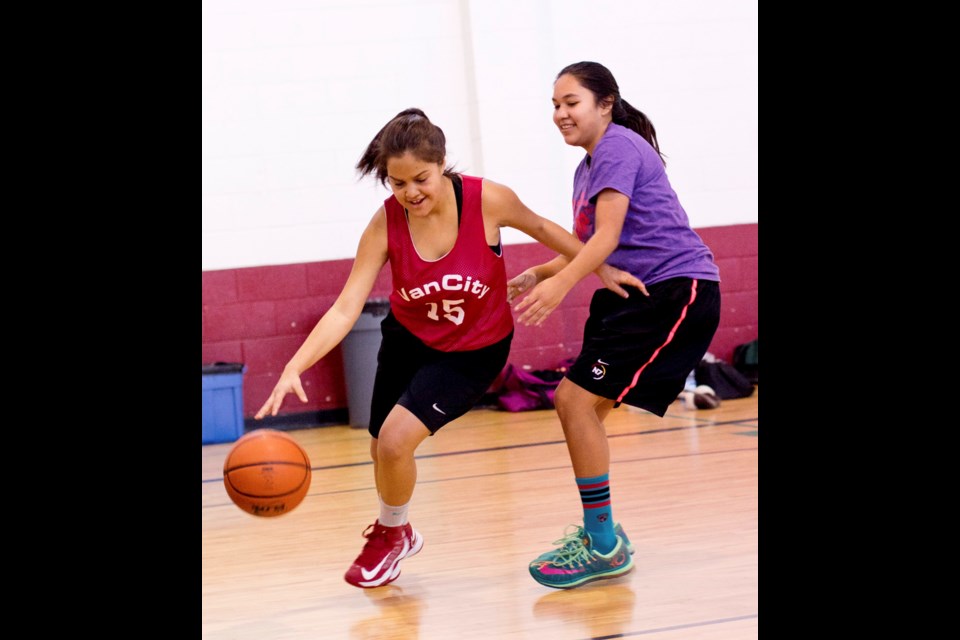A new school, a new support system and an entirely new way of life — Sarah Humchitt’s life has been in a constant state of flux for the last year.
Just 17 years old, the former Bella Bella resident moved to Vancouver in 2015 to advance her educational opportunities: she left her parents behind, along with her siblings and friends, moved in with her aunt and had to start anew.
Basketball has been the glue that’s helped build up her steely resolve, enabling her to balance studies while playing with two highly-competitive basketball clubs: her school team at Britannia secondary and an all-Aboriginal club run out of the Vancouver Aboriginal Friendship Centre.
“When you move from a small town to Vancouver, it’s a huge cultural shock,” she said. “In a small town like Bella Bella, you just learn the basketball basics, but you don’t get to apply them into game scenarios very often.”
Having played basketball since early childhood, giving up on hoops when she moved to the big city was a non-starter for Humchitt. Shortly after arriving in Vancouver, she learned of the all-Aboriginal team — known as Van City Nation — from family members who also played for the club.
The pressures of having to fit into a new team and new dynamic quickly melted upon attending her first practice last fall.
“It was a really welcoming environment,” said Humchitt, who belongs to the Heiltsuk First Nation. “As soon as I walked in the doors, the girls introduced themselves to me right away, and I’ve made a lot of friends from the team. The cultural diversity on the team certainly was an important factor in deciding to play for the team. I’ve played basketball since I was four years old, so it’s not something I can stop doing.”
The Van City Nation program was established more than a decade ago as a means to provide low-cost basketball to girls from First Nations backgrounds. Court time is donated by the friendship centre and there are no registration fees. The team gets together weekly to hold fundraising drives to enable them to travel to tournaments across Washington, Oregon and throughout B.C.
Coach James Savino began heading up the program four years ago and travels into Vancouver every weekend from White Rock to run practices and lead the club into tournament play.
“I know a lot of the kids can’t afford to play club ball because it’s really expensive,” he said. “This program keeps kids out of trouble and gives them something positive to look forward to in terms of being excited about travelling.”
The team is separated into two groups: the girls in grades 10 through 12 make up the senior team, while those ranging in age from eight to 14 play and train with the junior side.
About 30 players from across Metro Vancouver make up the team and many First Nations are represented within its ranks: Haida, Nisga’a, Heiltsuk and Metis, among others.
“We have pretty much every nation represented from up and down the West Coast,” Savino said. “For me, this team is about structure just as much as it is about basketball.”
That structure is maintained through balance, both physically and mentally. The coach keeps in tune with the players’ parents and other high school coaches to ensure they are regularly attending school and keeping their grades up.
Savino, who also coaches hoops at Surrey’s Earl Marriot secondary, maintains a tough-love approach — if the grades aren’t there, neither is the playing or practice time.
That mentality suits Tammy Prado just fine. Her 16-year-old daughter, Zuleyma, is a Killarney student who knows that school comes before posting up.
But above and beyond that, being involved with the team has shown the basketball player things that can’t be taught in a book or classroom setting.
“When she first started playing ball, she was fairly timid,” said Prado, who is of Metis descent. “If someone pushed her or things got rough, she would back down. Now she pushes back and that’s a good thing. You can’t be scared in basketball or in life.”
Wawmeesh Hamilton’s 12-year-old daughter Alexandra has been in the team’s ranks for a year and comes from both a Hupacasath and Nisga’a lineage.
While she may be too young to understand the cultural significance just yet, Hamilton believes he’s setting the stage for something bigger in her life. “This is a way of staying connected to our people and culture,” said Hamilton, a Courier contributor. “That’s important when you live in a multicultural city like Vancouver where it can be easy to get uncoupled from the link. It’s also a source of pride to play on an all-indigenous team.”
Those looking for more information on the team can call the Vancouver Aboriginal Friendship Centre at 604-251-4844.
[email protected]
@JohnKurucz


